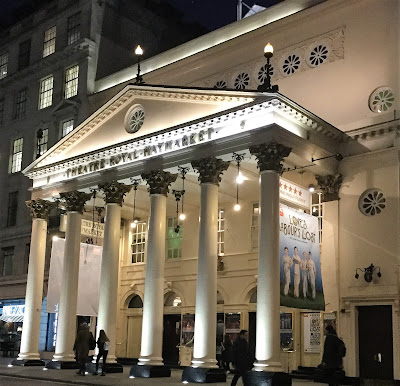A Time Out magazine special offer gave me the opportunity to see two Shakespeare plays in the New Year break. The Royal Shakespeare Company are playing a double bill of Much Ado about Nothing (or Love's Labour's Won) and Love's Labour's Lost.
Much Ado about Nothing is one of my favourite Shakespeare plays. I first saw it performed by the Royal Shakespeare Company at Stratford with Derek Jacobi as Benedick and Sinéad Cusack as Beatrice. Love's Labour's Lost was new to me apart from a few snippets. The versions at the Theatre Royal Haymarket bring the plots forward in time to periods before and after the First World War.
Much Ado remains a timeless classic for me. It doesn't matter that all the funny lines are well-known and anticipated in advance. I still laugh at the repartee between Benedick and Beatrice. It took me rather longer to warm to Love's Labour's Lost. I'm afraid that I found much of the early banter immature and irritating. The play was simply too wordy for my tastes. Too much word play eventually becomes tiresome, especially when the language has dated. Having said that, I did enjoy the role of the overly pedantic schoolmaster immensely.
The country house set is used to great effect in both plays. The Much Ado set even boasted a Christmas tree. It provided Benedick's hiding place in his famous eavesdropping scene.
 |
| The RSC's Much Ado About Nothing set with Christmas tree |
It was amazing to watch how the elaborate scenery slid in, out and across the stage to create different settings both inside and outside. It made an interesting contrast with the digital scenery that I saw last year at the Barbican and in Paris.
 |
| The RSC's opening set for Love's Labour's Lost |
For Love's Labour's Lost, I enjoyed being much closer to the action in the Royal Circle, whereas my head was up with the chandelier for Much Ado.
 |
| Chandelier as seen from Upper Circle at the Theatre Royal Haymarket |
A number of theatre-goers seemed to have difficulties with the alarmingly steep slope down to seats. After the steep climb to the Upper Circle, it made you dizzy to look down. The usher was available to hold your hand if required. Still, I was surprised that there wasn't even a handrail for elderly visitors to hold on to, especially given stringent health and safety rules these days. I did note that audio equipment was available for the hard-of-hearing.
The Theatre Royal Haymarket looks great from the outside, but inside it could do with some modernisation. There would probably be fewer empty weekday seats if the elderly felt comfortable reaching and leaving their seats. It's hard to see how some of London's more ancient theatres can be updated to modern accessibility standards.
I have always loved the way that Shakespeare mixes tragedy in comedy and comedy in tragedy. It seems much more true to life that way. Still, the end of Love's Labour's Lost catches you by surprise. The death of the Princess's father brings the merriment to an end. It is chilling to see the four male suitors dressed in military uniforms at the end. It leaves you regretting your earlier irritation with them and fearing for their fates in the bitter war to come. Comedy over.
Karen Andrews is a freelance French to English translator, transcreator, content writer and editor. She has a strong background in marketing and project management.
Email Karen for further information via karenanglicityen@gmail.com in French, German or English.

No comments:
Post a Comment